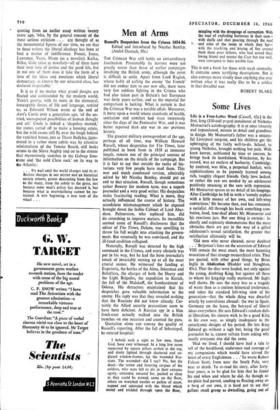Men at Arms
Russell's Despatches from the Crimea 1854-56. Edited and introduced by Nicolas Bentley. (Andre Deutsch, 50s.)
THE Crimean War still holds an extraordinary fascination. Presumably its horrors were not greatly worse than those of earlier campaigns involving the British army, although the point is difficult to settle. Apart from Lord Raglan, whose habit of calling the enemy 'the French' did not endear him to our new ally, there were very few soldiers fighting in the Crimea who had also taken part in Britain's last European war forty years earlier, and so the material for comparison is lacking. What is certain is that the Crimean War was a terrible affair. Moreover, it burst upon a world whose standards of health, sanitation and comfort had risen immensely since the days of the Peninsular War, and it was better reported than any war in our previous history.
The greatest military correspondent of the age, perhaps of all time, was William Howard Russell, whose despatches for The Times, later published in book form in 1858 at immense length, remain one of the principal sources of information on the details of the campaign. But it is fair to say that outside the ranks of his- torians very few people have read them. This new and much condensed version, admirably edited by Mr Nicolas Bentley, should put an end to that situation. Russell, though sometimes rather flowery for modern taste, was a superb journalist and a very good writer. His despatches make fascinating reading. What is more, they actually influenced the course of history. The scandalous mismanagement which he exposed brought down the feeble Cabinet of Lord Aber- deen. Palmerston, who replaced him, did do something to improve matters. So incredible seemed some of Russell's disclosures that the editor of The Times, Delane, was unwilling to throw his full weight into attacking the govern- ment But eventually he was convinced, and the ill-fated coalition collapsed.
Naturally, Russell 'was detested by the high command in the Crimea, and every obstacle was put in his way, but he had the born journalist's knack of invariably turning up at all the most crucial scenes. He witnessed the landing at Eupatoria, the battles of the Alma, Inkerman and Balaklava, the charges of both the Heavy and the Light Brigades, the expedition to Kertch, the fall of the Malakoff, the bombardment of Odessa. His detractors maintained that his despatches gave valuable information to the enemy. His reply was that they revealed nothing that the Russians did not know already. Cer- tainly the Allied security precautions seem to have been deficient. A Russian spy in a blue frock-coat actually walked into the British trenches on one occasion and counted the guns.
Quotation alone can convey the quality of Russell's reporting. After the fall of Sebastopol, he entered hospital:
I beheld such a sight as few men, thank God, have ever witnessed. In a long low room supported by square pillars arched at the top, and dimly lighted through shattered and un- glazed window-frames, lay the wounded Rus- sians. The wounded—did I say? No, but the dead,—the rotten and festering corpses of the soldiers, who were left to die in their extreme agony, untended, uncared for, packed as• close as they could be stowed, some on the floor, others on wretched trestles or pallets of straw, sopped and saturated with the blood which oozed and trickled through upon the floor, mingling with the droppings of corruption. With the roar of exploding fortresses in their ears— with shells and shot pouring through the roof and sides of the room in which they lay— with the crackling and hissing of fire around them these poor fellows, who had served their loving friend and master the Czar but too well, were consigned to their terrible fate.
This is not a book for those with weak stomachs. It contains some terrifying descriptions. But it also conveys more vividly than anything else ever written what it was really like to be a soldier in that dreadful war.
ROBERT BLAKE






























 Previous page
Previous page